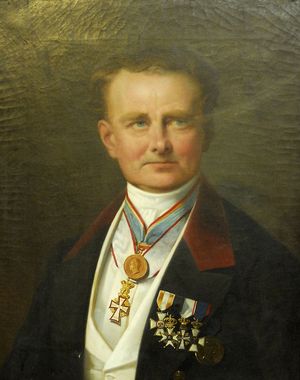The pre-historian Friedrich Lisch was born at Alt-Strelitz on 29 March 1801. He completed his studies at the grammar school at Güstrow with distinction and then began to study theology, history and mathematics at Rostock.
He subsequently studied languages at Berlin. After completing his studies he first worked as a teacher and librarian, including at the Fridericianum, the Grand Ducal grammar school in Schwerin.
In 1834 Grand Duke Friedrich Franz I. summoned him to the Privy and Principal Archive. During the years of his work there he opened the archive for academic historical research. In 1835 he founded the “Association for Mecklenburg History and Archaeology”, which he chaired for four decades.
As chairman he published the periodical “Yearbooks of the Association...” ln this periodical he published over four hundred essays on history, legal and church history, archaeology, genealogy, regional studies and ethnology, art theory and philology, numismatics and archive studies.
Friedrich Lisch’s services to prehistory and early history are especially noteworthy. Contemporaneously with the Dane Christian Jürgensen Thomsen he developed the “three-age system” which divides pre-history into the Stone, Bronze and Iron Ages.
Friedrich Lisch also had the task of supervising the iconographic programme for the remodelling works from the “academic-historical” point of view and in 1846 Grand Duke Friedrich Franz II. commissioned Friedrich Lisch to assemble a selection of characters from Mecklenburg’s history for the design of the windows in the Castle’s Old Court Hall.
He also devised the complete family tree of the house of Mecklenburg, which was placed in the Gallery of Ancestors.
During his time at Schwerin Friedrich Lisch was active in an extremely wide range of fields.
In 1867 he was elected Councillor to the Privy Archive of the Grand Duchy of Mecklenburg-Schwerin, not least because of his tireless creative activity.
Friedrich Lisch died at Schwerin on 22 September 1883.
Written by Martin Funk, Voluntary Social Year 2016/17

